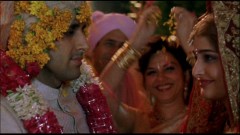Monsoon Wedding
Year of release: 2001
Directed by: Mira Nair
United States, Germany, Italy, France
The film charts preparations for a traditional Punjabi wedding between Aditi, the daughter of the wealthy Indian textile trader, Lalit Verma, and Hemant, a handsome computer engineer of Indian descent, based in Houston, Texas. When the groom arrives for the engagement and subsequent wedding festivities, Aditi is still in love with her ex-boss, the sleazy talk-show host of ‘Delhi.com'.
Following one last, clandestine rendez-vous with her lover the shortly before her wedding, Aditi realises the futility of her liaison with Vermat, a married man, and takes the considerable risk of confessing her premarital affair to her future husband. Angry and shocked at first by this revelation, he confides that he, too, has had a relationship with a woman in the past and proposes to go ahead with the wedding, because he respects Aditi’s honesty and because he believes that any marriage involves an element of risk: ‘What marriage isn’t a risk? Whether our parents introduce us or we meet in a club, what difference does it make?’. A scene showing Aditi and Hemant passionately kissing prior to their wedding day suggests that this arranged marriage will not be devoid of love and passion. In this way, the film vindicates the parental choice of husband as superior to Aditi’s own ill-advised choice of lover. The concept of the ‘arranged love marriage’, which made its first appearance in the Bollywood film Hum Aapke Hai Koun (Can You Name Our Relationship, Sooraj Barjatya 1995),also invalidates Western viewers’ prejudices that such marriages are based on archaic traditions that conflict with the modern values of Western society. As the trailer of Monsoon Wedding states, this is ‘the story of a modern family’.
In one of the film's subplots, Lalit Verma’s brother-in-law, the family patriarch Uncle Tej, is exposed as a paedophile who molested Aditi’s adopted sister, Ria, when she was still a child. Ria reveals this dark secret not to create a scandal or to belatedly take revenge, but in order to protect one of her young cousins from Tej’s advances. After painful deliberations Lalit expels Tej not just from the wedding celebrations but from the family for good. The association of the NRI relative with an act of sexual transgression supports the binarism tentatively established between a morally innocent India and the corrupting influence of Westernisation and globalisation, a binarism omnipresent in the moral universe of Bollywood cinema but which Mira Nair modifies in several ways.
Film Review by Georgia Coles-Riley (student on Transnational Cinemas Course, Royal Holloway, email: Georgia.Coles-Riley.2009@live.rhul.ac.uk)
The moment I finished watching Monsoon Wedding, I scoured facebook to find out if any of my old school friends had recently got engaged, so whetted was my appetite for ceremonious aplomb by this joyous, intricate dramatic comedy. I had initially reacted with distaste to its favourable depiction of arranged marriages, but, eventually, I let the warm colour palette wash over me, and allowed myself to indulge in enjoying its ridiculous displays of apparent blind faith in romance.
Mira Nair has done something intelligent with this film – it satisfies the Cosmopolitan reading audiences as well as the more traditional ones. This may well be because the film is an aggressive assault on the senses – scene after scene of warm colour, uplifting music, emotional intensity and uproarious humour. Everything looks nice in this film; even the unromantic adulterous scene, shot in a car in a lay-by, looks beautiful, bathed in road lights and the pretty raindrops of the monsoon. It's difficult for anyone not to like it, simply because it is trying so hard.
Screenwriter Sabrina Dhawan has borrowed storytelling techniques from a glorious selection of the world's great dramatists. I was enthralled by each intertwining story, one moment feeling as though I could be watching a barely comprehensible Latin American melodrama, and the next absorbed in a twist ridden Dickensian sub-plot. It is possible that it gets carried away with its own desire to give every character a story, which ultimately leaves all threads underdeveloped.
My favourite story line involved 'King' PK Dubey, the event manager. He and his haphazard gang of workers are shown sitting around their food, gossiping about the family they work for, which reminded me of the rude mechanicals in Shakespeare's A Midsummer Night's Dream. In fact, running a love story parallel to that which is central to the plot is certainly a Shakespearian technique, and there is something comforting in its narrative familiarity. Vijay Raaz's 'King' PK Dubey is incredibly endearing- he first appears as a traditional comic crook, lying to his employer and squawking unpleasantly at his workers. But he is turned tender by the innocent beauty of the Verma family maid, Alice, whose youthful, unfussy looks are reminiscent of Jean Simmons' Kanchi in Powell and Pressburger's Black Narcissus (1947). Alice, like Kanchi, tries on her mistress' jewellery in the mirror, and the scene in which Dubey and his 'rude mechanicals' watch her is delicately and wittily played. Tillotala Shome plays Alice beguilingly, with few words but an entirely captivating on screen presence. Nair introduces Alice in a gentle, unhurried scene, where the young girl collects glasses and is distracted by the beauty of scattered marigolds. It is impossible not to be drawn in by the simple grace of her movements, which give the audience a much needed rest from the fuss and excitement of the family's wedding preparations.
The romance central to the film is probably the least interesting. Aditi Verma (Vashandura Das) and Hemant Rai (Parvin Dabas) are the betrothed couple, who have never met each other prior to the wedding weekend. They are young and beautiful, like Bollywood stars, but when they ultimately share their 'true loves first kiss', it is with all the chemistry of sea monkeys mating. The 'dates' they share in the run up to the wedding are unnerving viewing for a Western audience, unfamiliar with the conventions of arranged marriage, and especially confused by the modernised, Westernised Delhi that the courtship is set against. The dialogue the couple share is excruciatingly staid, and, worst of all, he doesn't even make her laugh very often, which makes me suspicious of her ultimate decision not to abandon ship and cancel the wedding.
Aditi's taste in men is revealed to be very dubious from the start, as she is conducting a pre marital affair with a television host whose beard supersedes his personality. In one of the opening scenes, he hosts a TV debate about censorship, which invites a frumpy dubbing artist on to read from a sexually explicit script. The scene nicely introduces us to the central theme of culture clash, as we are invited to be amused by a haughty guest in traditional Indian dress who reacts with disgust to the sounds of orgasm.
Cinematographer Declan Quinn intersperses shots of the Verma family in their comfortable modern home, with images that instantly conjure up a picture postcard poverty stricken Dehli: people packed on to motorcycles chug through the traffic ridden streets, and people are packed into dusty marketplaces. In one scene, father of the bride Lalit is seen playing golf with his male relatives. This scene of these upper middle class men Northern Indians enjoying a Western past-time is offset by a group of women who walk by, who wear traditional orange saris and carry baskets on their heads. In another scene, there is a discussion between Dubey and Lalit, who is dismayed at the wedding planner's decision to use white material for the wedding tent. In India, of course, white is traditionally the colour of mourning, but Dubey insists that it is now the fashion to follow Western tastes and use white material for weddings.
The Vermas are a transnational family, and this is reflected linguistically. Everybody speaks in a mixture of Hindi, English and Punjabi, and one cousin speaks Hindi in an Australian accent. The use of the occasional English word is charming, like when Dubey insistently uses 'approximately' and 'exactly', even when he means precisely neither. Many of the family members speak perfect English, however, as they have returned for the wedding from a variety of English speaking countries. Ayesha Verma (Neha Dubey), Aditi's attractive cousin, pursues Rahul (Randeep Hooda), who is visiting from Australia. She mocks him for not being a 'proper Indian boy' any more, while he is intrigued by the tattoo she has on her arm. Although she appears to be as Westernised as he is, his abandoning of his cultural roots ultimately frustrates her, as he refuses to dance with her to Punjabi music, insisting he doesn't know how to.
The tense relationship between Lalit Verma and his immediate family provide a dynamic that is very familiar in comedy, though Lalit ends up playing both the straight man and the fool. He also takes up both the indignant patriarch role, and the weeping, shattered father, whose primary concern is the well-being of his family. Lalit, played by the Indian national treasure Naseeruddin Shah, is likeable, unassumingly good looking and riddled with flaws with which we can relate. Shah appears to have a lot of fun in the role, but also plays the darker moments with sensitivity, furrowing his dark eyebrows and clenching his mouth shut.
His wife, Pimmi, played by the glamorous Lillete Dubey, is a criminally underdeveloped character. She appears in scenes to console Lalit or to provide insights into his daughters for him, but her own emotions are hardly considered. Their own 'love story', however, is sensitively played. One scene sees Pimmi console a weeping Lalit, who has crawled into the foetal position on her bed (they sleep in separate beds, a reminder of the conservatism of the culture we are observing).
The storyline that threatens to bring the celebrations to a standstill involves Ria Verma (Shefali Shetty), Aditi's unmarried older cousin. She is a sensitive character, who indicates at one point that she wants to study creative writing in America. Her father is long dead and has left Ria in the care of his brother, Lalit. Ria at first appears to be a typical jealous sister character, who sits with Aditi in a taxi and pours heavy criticism over her love life. She risks being a ridiculous character, such is the extent of the suffering which is piled upon her, but she bares her pain well and with dignity.
I burst into spontaneous applause during the final scene, when sparks flew across the wedding tent as Ria landed her lonely eyes on an attractive young man, and it was evident that this was to be a love interest. I was overcome by Nair's unabashed decision to introduce a love interest for Ria so late into the story, and like to think that it was a self aware choice.
When the monsoon finally falls on the wedding, everything is safe and dry (although not literally). As is to be expected by a romantic comedy drama, all the stories tie together, and the sense of chaos and tension that builds up throughout the film is dissipated as all the guests enjoy a delirious dance in the rain. All trauma and tension appears to have been forgotten, and this is applicable, for a time at least, to Monsoon Weddings audience, so contagious is the joy.
Filed under: Secrets | South Asian diaspora | Wedding / Marriage


